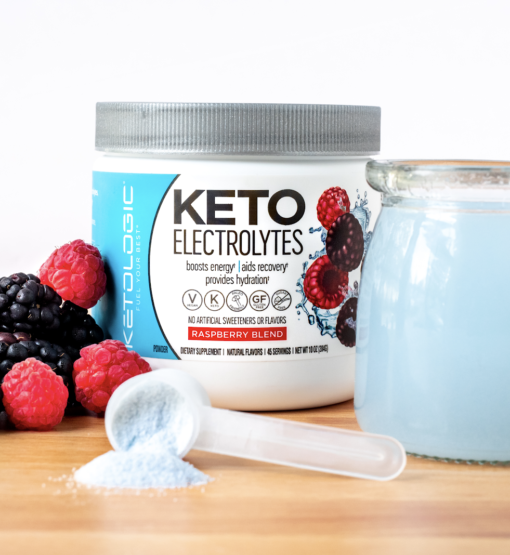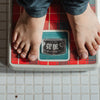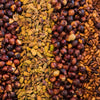Your Guide to Keto Electrolytes: Sources and Symptoms

Everyone needs them, and yet they seem to evade even the most diligent ketogenic dieter, which means hello, keto flu.
If you’re feeling concerned, confused, or maybe even a little scared about electrolytes, you’re not alone (and you definitely don’t need to feel that way, either). Once you nail your electrolyte levels, you might just find that some of your most persistent keto-related problems magically cease to exist.
Put down that carb-filled snack, and get ready to become the master of your own electrolyte intake.
In this article you’ll learn:
The Most Important Electrolytes on Keto and Why You Need Them
Despite what you might think, electrolytes are not a supplement invented by sports drink companies. Electrolytes are the many minerals that are necessary for the body’s vital functions[*], from regulating pH levels to keeping your body hydrated.Electrolytes are obtained from the foods we eat and are then carried throughout (and expelled from) the body in fluids such as sweat and urine.
The three most important electrolytes to monitor on a keto diet are:
-
-
- Potassium
- Magnesium
- Sodium
-
This is important to note, because electrolytes are retained in water, and on keto, your body can’t use electrolytes as efficiently since a significant amount of them are either being flushed out or not absorbed.
Take a look at the daily electrolyte recommendations below:
You might have read recommendations to consume 5,000mg of sodium a day on keto. This is because your body is retaining less water (and sodium) when in ketosis, so sticking to the higher end of the recommended sodium intake is ideal.Don’t worry, staying on top of your electrolytes isn’t nearly as much of a burden as you might think. We’ll even tell you exactly how to get enough electrolytes every day through supplements or food later in this article.
Signs You Need More Electrolytes
Remember that Snickers advertisement where the guy starts getting a little angsty, and his buddy reminds him to eat a Snickers to get rid of his “hanger”?While keto is literally the opposite of eating sugar to get your blood sugar to spike, that advertisement is still a pretty good analogy of your body being low on electrolytes. That is, you’ll probably be able to tell if you’re low.
Some of the signs you need more electrolytes (particularly sodium) include:
-
-
- Headaches
- Fatigue
- Muscle cramps
- Poor performance during workouts
- Exhaustion
- Increased thirst
-
In case the appeal of staving off that splitting headache and fatigue aren’t appealing enough, there are also a tonne of positive side effects that come with getting enough electrolytes. Some of these are:
-
-
- Decreased thirst
- Increases energy
- Less muscle fatigue during workouts
- Fewer muscle cramps.
-
You can also ask your doctor to test your electrolytes if you’re concerned about imbalances. This isn’t necessary but can provide peace of mind.
What About an Electrolyte Overdose?
There can definitely be too much of a good thing with electrolytes. In some cases, overloading on electrolytes can be incredibly dangerous.Your body can only handle so much magnesium, but it’s also pretty efficient at getting rid of the excess. Unfortunately, that means that orally ingesting more magnesium than you need will result in some pretty intense digestive issues while your body attempts to expel it[*]. Consume more than 400mg and you’ll know about it.
This is why a lot of people prefer to use a topical magnesium spray or cream to soothe sore muscles, especially after an intense workout.
Sodium overdose is incredibly rare, even on a keto diet. This is because sodium’s strong, salty taste means it’s difficult to overconsume. And don’t forget that more electrolytes (including sodium) are flushed from a body in ketosis due to reduced water retention.
Lack of sodium, on the other hand, can cause dehydration, since sodium’s purpose is to regulate water in the body. This is why it’s extra important to salt your keto meals.
Eating too much magnesium can be unpleasant, but too much potassium is extremely dangerous. This is also why it’s so difficult to find potassium supplements that have anything more than a minuscule amount of potassium in them.
Signs of potassium overdose include:
-
-
- Racing or abnormal heart rate
- Heart palpitations
- Numbness
- Tingling
-
How to Get Enough Electrolytes on Keto
There are two ways to get your electrolytes: From supplements, or from food.Getting everything you need from food is ideal, but it does require you to pay more attention to your diet. This is why electrolyte supplements are such a great option.
It’s worth noting that some people have no issue hitting their electrolyte needs every day with food, without ever having to really think about it. So while it’s crucial that you’re getting enough electrolytes, don’t worry about having to track and monitor your food for the rest of your keto journey.
Want to know more about getting electrolytes from supplements versus food? Let’s compare the two.
#1: Electrolyte Supplements

Electrolyte supplements can be a total gamechanger, but they’re not all created equal.
If you’ve been keto for even half a day then you’re likely well aware that sugar is hiding in just about everything. Which is why trying to find sugar-free electrolytes can be such a struggle.
Whether it’s an electrolyte sports drink or a powder, sugar is almost always the first ingredient. It can be difficult to find electrolyte supplements that aren’t just low in sugar, but taste good, too.
Luckily, keto-friendly options do exist.
Keto Electrolytes have less than one gram of net carbs per serve, are sweetened with keto-friendly stevia, and don’t boast an ingredients list you need a science degree to translate. It’s everything you need to give yourself a simple boost of electrolytes.
Plus, you can choose from two flavors (raspberry or pineapple), or opt for unflavored to add to your daily protein shake.
#2: Beta-Hydroxybutyrate (BHB)

Beta-Hydroxybutyrate (BHB) is a ketone body produced from fat by the liver for energy when glucose isn’t available. It’s also available
BHB, or Exogenous Ketones, are some of the most popular supplements on the ketogenic diet.
That’s partially because BHB curbs appetite and carb cravings, and can boost mental performance. But another reason BHB is so popular among keto enthusiasts is that the minerals in BHB salts act as potent electrolytes, reducing the symptoms of keto flu and many other “side effects” of keto.
#3: Bone Broth

One of the top food sources of electrolytes, likely due to it’s sodium and mineral content, is bone broth.
Not just good for your gut and a great source of collagen, bone broth also often comes fortified with electrolytes.
Try sipping a hot cup of bone broth throughout the day or even trying a bone broth fast.
Choose something easy and high-quality, like FBOMB Grass-Fed Bone Broth. And in case you’re wondering, here’s an easy breakdown of why grass-fed is best.
#4: Food Sources of Electrolytes
Almost all keto whole foods are abundant in electrolytes. However, keep in mind that you do have to eat a lot of each food to replenish and balance your electrolyte levels. That’s why supplements exist!Here are the most electrolyte-dense keto foods that you can easily include in your daily diet:
Foods high in sodium
-
-
- Sea salt- 2325mg per teaspoon
- Ham- 1,117mg per 3oz
- Parmesan cheese- 433mg per oz
- Chicken thigh- 345mg per 3oz
- Feta cheese- 316mg per oz
- Pickles- 240mg per oz
- Swiss chard- 100mg per cup
-
-
-
- Brazil nuts- 106mg per oz
- Almonds- 80mg per oz
- Tofu- 74mg per cup
- Dark chocolate- 64mg per oz
- Hemp seeds- 60mg per tablespoon
- Tuna- 54mg per 3oz
- Avocado- 44mg per cup
- Pumpkin seeds- 40mg per tablespoon
- Chia seeds- 40mg per tablespoon
- Flax seeds- 40mg per tablespoon
- Kale- 30mg per cup
- Swiss chard- 29mg per cup
- Mackerel- 28mg per 3oz
- Cacao powder- 27mg per tablespoon
- Green beans- 25mg per cup
- Peanut butter- 24mg per tablespoon
- Spinach- 24mg per cup
- Salmon- 23mg per 3oz
- Brussels sprouts- 20mg per cup
- Broccoli- 19mg per cup
- Spirulina- 14mg per tablespoon
-
-
-
- Lite Salt- 720mg per half teaspoon
- Avocado- 700mg per cup
- Coconut cream- 630mg per cup
- Brussels sprouts- 342mg per cup
- Kale- 329mg per cup
- Greek yogurt- 320mg per cup
- Pork loin- 305mg per 3oz
- Broccoli- 297mg per cup
- Artichokes- 273mg per medium artichoke
- Beef- 270mg per 3oz
- Mackerel- 267mg per 3oz
- Salmon- 250mg per 3oz
- Bone broth- 240mg per cup
- Mushrooms- 222mg per cup
- Green beans- 209mg per cup
- Tuna- 201mg per 3oz
- Almonds- 200mg per oz
- Chicken thigh- 187mg per 3oz
- Brazil nuts- 186mg per oz
- Spinach- 167mg per cup
- Dark chocolate- 158mg per oz
- Swiss chard- 136mg per cup
- Hemp seeds- 100mg per tablespoon
- Flax seeds- 83mg per tablespoon
- Cacao powder- 82mg per tablespoon
- Pumpkin seeds- 80mg per tablespoon
-
Breakfast:
- 1 cup Swiss chard
- 1oz feta
- 3 eggs
- 2 tablespoons hemp seeds
- ⅓ teaspoon sea salt
- 1oz pickles
- 1oz almonds
- 1 tablespoon pumpkin seeds
- 1 cup bone broth
- 3oz ham
- ½ cup avocado
- 1 cup spinach
- ⅓ teaspoon sea salt
- 3oz chicken thigh
- 1 cup kale
- 1 cup bone broth
- 1oz parmesan cheese
- ½ cup avocado
- ⅓ teaspoon sea salt
Electrolytes and Working Out
Electrolytes are important on keto, but they’re especially important for anyone who works out regularly. This is because of their role in helping your body to stay hydrated and assist muscle contraction. Plus, you’re probably losing way more electrolytes than usual by sweating.Want to be a fat-fuelled athlete? Make electrolytes your new best friend. Mix some KetoLogic Keto Electrolytes into your shaker at the gym, make your own ketoade, or just add a little salt to your water. This can make a world of difference and bring your workouts back to their pre-keto levels of awesomeness.
-
Posted in
Authority Article, Keto Foods, Nutrition, Nutrition Article, Weight Loss




